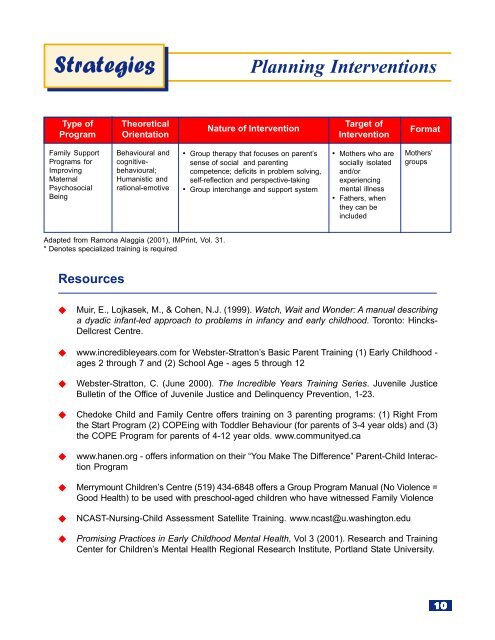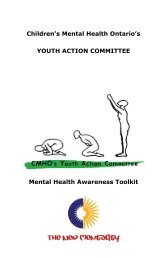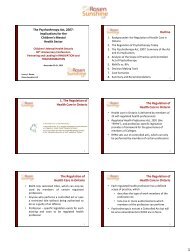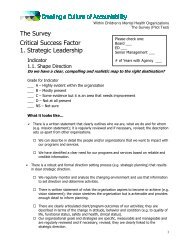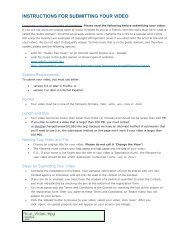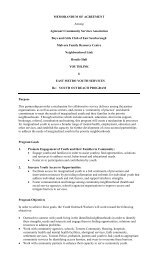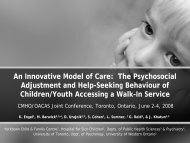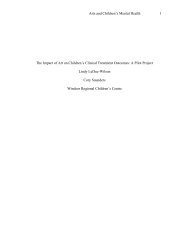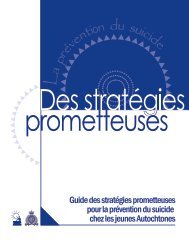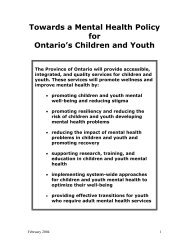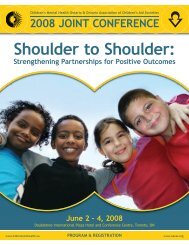Early Childhood Mental Health Treatment: Training Reference Guide
Early Childhood Mental Health Treatment: Training Reference Guide
Early Childhood Mental Health Treatment: Training Reference Guide
You also want an ePaper? Increase the reach of your titles
YUMPU automatically turns print PDFs into web optimized ePapers that Google loves.
Strategies<br />
Planning Interventions<br />
Type of<br />
Program<br />
Theoretical<br />
Orientation<br />
Nature of Intervention<br />
Target of<br />
Intervention<br />
Format<br />
Family Support<br />
Programs for<br />
Improving<br />
Maternal<br />
Psychosocial<br />
Being<br />
Behavioural and<br />
cognitivebehavioural;<br />
Humanistic and<br />
rational-emotive<br />
• Group therapy that focuses on parent’s<br />
sense of social and parenting<br />
competence; deficits in problem solving,<br />
self-reflection and perspective-taking<br />
• Group interchange and support system<br />
• Mothers who are<br />
socially isolated<br />
and/or<br />
experiencing<br />
mental illness<br />
• Fathers, when<br />
they can be<br />
included<br />
Mothers’<br />
groups<br />
Adapted from Ramona Alaggia (2001), IMPrint, Vol. 31.<br />
* Denotes specialized training is required<br />
Resources<br />
<br />
Muir, E., Lojkasek, M., & Cohen, N.J. (1999). Watch, Wait and Wonder: A manual describing<br />
a dyadic infant-led approach to problems in infancy and early childhood. Toronto: Hincks-<br />
Dellcrest Centre.<br />
www.incredibleyears.com for Webster-Stratton’s Basic Parent <strong>Training</strong> (1) <strong>Early</strong> <strong>Childhood</strong> -<br />
ages 2 through 7 and (2) School Age - ages 5 through 12<br />
<br />
<br />
<br />
Webster-Stratton, C. (June 2000). The Incredible Years <strong>Training</strong> Series. Juvenile Justice<br />
Bulletin of the Office of Juvenile Justice and Delinquency Prevention, 1-23.<br />
Chedoke Child and Family Centre offers training on 3 parenting programs: (1) Right From<br />
the Start Program (2) COPEing with Toddler Behaviour (for parents of 3-4 year olds) and (3)<br />
the COPE Program for parents of 4-12 year olds. www.communityed.ca<br />
www.hanen.org - offers information on their “You Make The Difference” Parent-Child Interaction<br />
Program<br />
Merrymount Children’s Centre (519) 434-6848 offers a Group Program Manual (No Violence =<br />
Good <strong>Health</strong>) to be used with preschool-aged children who have witnessed Family Violence<br />
<br />
<br />
NCAST-Nursing-Child Assessment Satellite <strong>Training</strong>. www.ncast@u.washington.edu<br />
Promising Practices in <strong>Early</strong> <strong>Childhood</strong> <strong>Mental</strong> <strong>Health</strong>, Vol 3 (2001). Research and <strong>Training</strong><br />
Center for Children’s <strong>Mental</strong> <strong>Health</strong> Regional Research Institute, Portland State University.<br />
10


